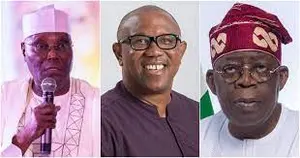Presidential Poll: Supreme Court Hears Appeal Against Tinubu's Election with Tightened Security
In a pivotal moment, the Supreme Court is currently hearing an appeal challenging the results of the Presidential Poll, specifically focusing on Bola Tinubu's election. Security measures have been significantly increased, reflecting the importance and sensitivity of this legal process.

October 23, – Heavy security has been beefed around the Supreme Court of Nigeria Complex in the three arms zones of Abuja, as the Apex Court commenced hearing on the three appeals filed against the judgement of the Presidential Election Petition Court (PEPC), Abuja.
The court has been cordoned off by heavily armed security personnel to prevent unaccredited lawyers and litigants from gaining access to the courtroom.
Meanwhile, the All Progressives Congress (APC) National Chairman, Abdullahi Ganduje; National Secretary, Senator Bashir Ajibola; LP chairman, Julius Abure; the Chief of Staff to the President, Femi Gbajabiamila; the National Security Adviser (NSA) Nuhu Ribadu and other party faithful, have taken their seats in the courtroom.
The panel of seven justices of the apex court is led by Justice Inyang Okoro. Others are Justice Helen Ogunwumiju, Justice Ibrahim Saulawa, Justice Adamu Jauro, Justice Tijani Abubakar, Justice Emmanuel Agim and Justice Lawal Garba.
Reports that a five-member panel of Justices, led by Haruna Tsammani, had on September 6, dismissed the three petitions filed separately by Atiku Abubakar, Presidential candidate of the Peoples Democratic Party (PDP) in the 2023 General election, his counterpart in the Labour Party (LP), Peter Obi and the Allied Peoples Movement (APM); and affirmed the election victory of President Bola Tinubu as winner of the February 25 Presidential election in Nigeria.
Dissatisfied with the outcome of the judgement, the petitioners approached the Supreme Court to challenge the judgement.
All the appellants are praying to the apex court to set aside the judgement of the PEPC, which affirmed Tinubu of the ruling All Progressives Congress (APC), as the valid winner of the presidential poll.
While Atiku, through his team of 67 lawyers comprising 18 Senior Advocates of Nigeria, led by Chief Chris Uche (SAN), filed 35 grounds of appeal to challenge Tinubu’s victory, Obi, through his own team of lawyers, led by Dr Livy Uzoukwu (SAN), filed 51 grounds of appeal before the Supreme Court.
On its part, the APM lodged a 10-ground appeal to invalidate President Tinubu’s election.
Both Atiku, who came second in the election and Obi, who came third, are seeking to set aside the judgement of the Justice Haruna Tsammani-led five-member panel of the PEPC.
Atiku contended that the verdict of the PEPC was not only “against the weight of evidence”, but occasioned a grave miscarriage of justice against him.
He insisted that the PEPC panel erred in law, when it failed to nullify the presidential election on the grounds of non-compliance with the Electoral Act, 2022, even when evidence showed that the Independent National Electoral Commission, INEC, acted in breach of extant laws and regulations guiding the conduct of elections.
Atiku accused the PEPC of reaching its unanimous decision based on gross misconstruction and misrepresentation of provisions of both the 1999 Constitution, as amended, and the Electoral Act, 2022.
He argued that sections 64(4) & (5) of the Electoral Act, as well as INEC’s Regulations & Guidelines for the conduct of the election, which he tendered in evidence, made mandatory, the use of the Bimodal Voter Accreditation System, BVAS, machines for electronic transmission of results of the election directly from the polling units to INEC’s collation system for the verification, confirmation and collation of results before the announcement.
He prayed the Supreme Court to, among other things, hold that Tinubu was not duly elected by a majority of lawful votes cast in the election and also declare that he was not qualified to be declared the winner.
Aside from praying the court to declare him as the authentic winner of the election and order his swearing-in as President, Atiku, in the alternative, urged the court to order a run-off between him and Tinubu or to nullify the entire poll and order INEC to conduct a fresh one. Cited as respondents were INEC, Tinubu and the APC.
Also, Obi had in his appeal argued that the PEPC panel erred in law and thereby reached a wrong conclusion when it dismissed his petition.
He alleged that the panel wrongly evaluated the proof of evidence he adduced before it and occasioned a grave miscarriage of justice when it held that he did not specify polling units where irregularities occurred during the election.
Obi and the LP further faulted the PEPC for dismissing their case on the premise that they did not specify the figures of votes or scores that were allegedly suppressed or inflated in favour of President Tinubu and the APC.
They accused the Justice Tsammani-led panel of erring in law when it relied on paragraphs 4(1) (d) (2) and 54 of the First Schedule to the Electoral Act 2022 to strike out paragraphs of the petition.
Obi further alleged that the lower court ignored his allegation that certified true copies of documents that INEC issued to his legal team, comprised of 8, 123 blurred results that contained blank A4 papers, pictures and images of unknown persons, purporting same to be the CTC of polling units results of the presidential election.
In its appeal, the APM maintained its position that Tinubu was not eligible to participate in the presidential poll and said that the PEPC relied on a technicality to dismiss its petition challenging Tinubu’s nomination by the APC.
According to the party, the PEPC erred in law, when it wrongfully waved aside the allegation that Tinubu’s running mate and Vice President, Kashim Shettima, was nominated twice for different positions by the APC, in relation to the 2023 general elections.
It faulted the verdict of the PEPC, saying it was wrong for the court to dismiss its case against Tinubu’s election on the premise that it was not only incompetent but contained pre-election issues.
APM argued that sections 131 and 142 (1) of the 1999 Constitution, as amended, were inextricably linked “and neither can be confined as a pre-election matter, as these qualifications are condition precedents to being elected to the office of President.”
The APM is praying for the Supreme Court to nullify and void all votes scored by APC in the Presidential election, as well as to make an order, directing INEC to return the second-highest score at the election as the winner of the presidential contest.
However, President Tinubu, APC and INEC have prayed the apex court to dismiss the appeals which they said were bereft of merit.
President Tinubu also urged the court to reject an application that Atiku filed for permission to tender a copy of his certificate that was released by the Chicago State University.



